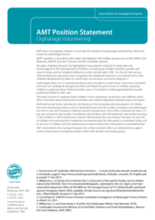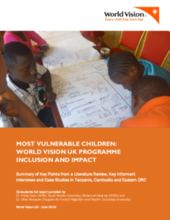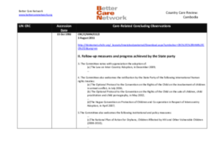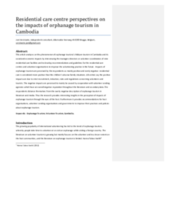This country page features an interactive, icon-based data dashboard providing a national-level overview of the status of children’s care and care reform efforts (a “Country Care Snapshot”), along with a list of resources and organizations in the country.
demographic_data
childrens_living_arrangement
children_living_without_bio
social_work_force
key_stakeholders
Key Stakeholders
Add New DataOther Relevant Reforms
Add New Datadrivers_of_institutionalisation
Drivers of Institutionaliziation
Add New Datakey_research_and_information
Key Data Sources
Add New DataMapping of residential care facilities in the capital and 24 provinces of the kingdom of Cambodia
National estimation of children in residential care institutions in Cambodia: A modelling study
Prevalence and number of children living in institutional care: global, regional, and country estimates
Shaping the national social protection strategy in Cambodia: Global influence and national ownership
Towards a Social Protection Strategy for the Poor and Vulnerable: Outcomes of the consultation process
Country Care Profile: Cambodia
Acknowledgements
Data for this country care snapshot was contributed by partners at Family Care First and UNICEF Cambodia.
Displaying 211 - 220 of 285
In this position statement, the Association of Massage Therapists (AMT) of Australia clearly states that it does not endorse orphanage volunteering, referring to the positions of the Better Care Network, UNICEF, Save the Children and the ChildSafe network.
According to this article from the Phnom Penh Post, the government of Cambodia has announced that 11 orphanages in Cambodia have been closed since the year 2011.
The purpose of the research highlighted in this report was to assess and analyze the extent to which World Vision UK is reaching ‘the most poor and marginalised’ or Most Vulnerable Children (MVC) through its Child Protection programming in Cambodia, Tanzania, and Eastern DRC.
The Central Authority for Inter-Country Adoptions of Cambodia has begun to enter into agreements with several countries to resume inter-country adoptions, after a four-year suspension due to child trafficking concerns, according to the article.
Orphanage tourism is on the rise in Myanmar and in other countries in the region such as Cambodia and Thailand, according to the article.
This country care review includes the care related Concluding Observations adopted by the Committee on the Rights of the Child.
This article analyses on the phenomenon of orphanage tourism/ childcare tourism in Cambodia and its social and economic impacts by interviewing the managers directors or volunteer coordinators of nine residential care facilities and to develop recommendations and guidelines for the residential care centres and volunteer organisations to improve the volunteering practice in the future.
This study sought to understand gender differences in potentially traumatic events (PTEs) in orphaned and separated children in 5 low- and middle-income countries (LMIC): Cambodia, Ethiopia, India, Kenya and Tanzania.
Family Care First, an initiative of the U.S. Agency for International Development (USAID) in Cambodia, is seeking innovative high-impact solutions to reduce the number of children living outside of family care in Cambodia.
This video explores the "business" of orphanage tourism in Cambodia and the ways in which Australians contribute to the problem.




